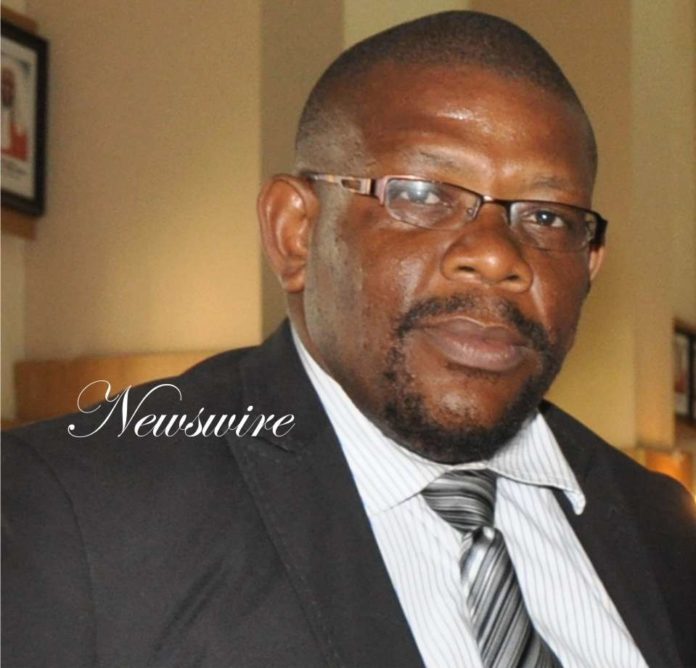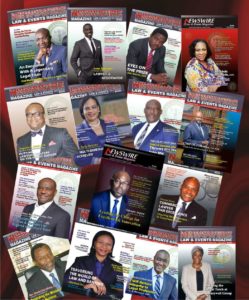A Painless Solution to Law Enforcement Misconduct – Tochukwu Chukwmerije
In a city like Lagos, a lot of Nigerians carry lawyer’s card with them all the time, they always assumed something could happen to them. The constitution and other relevant laws place limits on how far the law enforcement agent(s) can go in trying to enforce the law. The agent(s) sometimes go too far, and when this incident happens the victim may have recourse through federal and state laws.
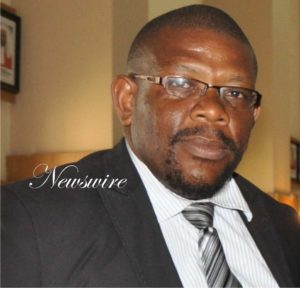
Law enforcement misconduct refers to ill- appropriated conduct and or illegal actions taken by law enforcement agent(s)/officers in connection with their official duties. Law enforcement misconduct terms refer to a wide range of procedural, criminal and civil violations. Misconduct is the broadest category. Misconduct is procedural when it refers to Law enforcement that goes against its internal rules and regulations. Misconduct is ‘Criminal’ when it refers to law enforcement who defies state and federal laws. It is civil or unconstitutional when it refers to law enforcement who abuses a citizen’s constitutional or fundamental rights. The profit or any type of material benefit gained illegally as a result of the law enforcement’s authority is considered misconduct. Bribery, extortion, receiving and fencing stolen goods and the worst of them all, brutality are all forms of misconduct. The act of brutality has been in use since 1883 when it first appeared in a London paper The Poor Man Guardian.
Law enforcement brutality is the abuse of authority by the unwanted infliction of excessive force by personal involved in law enforcement while performing his official’s duties. The term also applied to abuses committed by prison officials in state and federal prisons including prisons under military and intelligence control. This misconduct is usually applied in the context of causing physical harm, but it also involves psychological harms through the use of intimidation tactics beyond the scope of officials sanction procedure. It is evident that officials who engage in the misconduct do so with the approval of their superiors or they are the bad eggs. In most cases they perpetrate their actions under the cover of law and most times, engage in a cover-up of their illegal activities.
In Nigerian legal system an accused person is presumed innocent until proven guilty by a court of competent jurisdiction. The consideration of the liberty of the individual who seek a redress is the cardinal duty of the court – see R vs. McKenna (1960) 1 Q. B 411 at 422. Citizens who have been arrested by law enforcement agent(s) still have the same rights as they did before the arrest. Unfortunately the officers choose to ignore those rights many a times. In Obikoya and sons Ltd v Governor of Lagos State (1987) I.N.W.L.R (pt. 50) 385, the court held, ‘‘that the provisions of a constitution, which itself are a living piece of legislation must be construed broadly and not in a pedantic way: they must be given generous and purposive construction, particularly those provisions dealing with fundamental human right”. The act of brutality by law enforcement officers is a serious matter that unavoidably impacts the lives of their victims and their loved ones negatively. The fact that the police is now operating outside its jurisdiction as provided by section 4 of Police Act by dealing in civil matters i.e. recovery of debt, land matters etc. is an enormous problem that has seriously undermined the legal profession and the business of law. To my knowledge, one can file a claim for the following misconducts, unnecessary use of excessive force, false imprisonment, planting and destroying evidence, illegal searches, and seizure of property not related to any crime, involvement in civil matters, corruption, malicious prosecution, violation of individuals constitution or fundamental rights, discriminatory arrest physical or verbal harassment, coerced false confession, intimidation, perjury, witness tampering, brutality etc.
It is eminent to sensitize the populace that law enforcement misconduct can be difficult and complex and often present challenges to victims and their lawyers. On a daily, luck victims are injured and then sent straight to prison or cell and the unlucky ones are sent straight to their graves, with no caskets. If the victim is free after experiencing the misconduct, I recommend that the victim should; (1) Document everything, especially the extent of injuries suffered by taking as many pictures as possible. Take photographs of any injuries or damage caused, and set aside clothing or other objects that was torn or stained with blood from the incident. Write down as quickly as possible what exactly happened so as not to forget important details. (2) Seek medical attention (3) obtain the contact information of any witnesses to the scene of the incident. (4) Wear or use technological enhanced gadgets to record live events. (5) Consult your lawyer.
The Physical, emotional and mental consequences of law enforcement misconduct cannot be over emphasized. The society place trust in them and the betrayal of that trust should not go unpunished. The Nigerian Bar Association (“NBA”) through its Human Rights Committees of the One Hundred and Twenty (120) Branches should not allow the betrayal of that trust not to face the law criminal and civil. The NBA should listen to the story of every Nigerian and help in the best way to proceed with the specific case. At the NBA we must work hard to hold the guilty parties accountable for their actions. NBA should work to help millions of Nigerians including lawyers obtain compensation for law enforcement misconduct, loss of property and time spent in prison for crimes the accused never committed. The securing of claims against law enforcement are an important part of our legal system, providing a balance between the duties of law enforcement to up hold the laws, and the rights of citizens to be free from law enforcement misconduct – See Section 35(6) 1999 Constitution – Anyone unlawfully arrested is entitled to compensation. A law enforcement agent is immune from prosecution when he is lawfully executing his constitutions rights to uphold the law. I salute the good, educated, intelligent law enforcement agent(s) that do not embarrass or harass a lawyer in the course of his duty. I hail your gentleness. This immunity exists to prevent fear of legal prosecution from inhibiting an officer for enforcing the law. However, this immunity will be defeated if the officer’s conduct violates a clearly established constitutional or statutory right.
The NBA should make hay while the sun shines because some law enforcement agent(s) i.e. the Police, DSS, EFCC etc have started treating lawyers in course of their legal duty with iron gloves. We witnessed the recent incident in Imo State were police officers invaded the Magistrate court premises and disrupted the business of the day. Lawyers are ignored or sometimes humiliated. The Administration of criminal justice is clear on the position of a Legal representative when interviewing a suspect, but the Police and other security agents treat the said law with impurity – See Section 6(2) (a) Administration of criminal Justice Act (2015). However when a law enforcement agent’s day turns to night he or she would hurriedly hire a lawyer. We all saw last year when the Senate invited the Inspector General of Police (“IGP”) on the allegation of a senator. The IGP never spoke in that session except through his lawyer. The question is would the Police grant the same right to another on the allegation of another? I dare to state that it is getting to that time when the legal community will be confronted with the question; don’t lawyers have the right to say we’ll not represent this officer(s) in any legal matter because he maltreats our colleagues in course of their Legal duty and deny citizens their right to counsel?
The effort to combat law enforcement misconduct is to focus on various aspects of law enforcement culture and the psychology which may manifest itself when individuals are placed in a position of authority over others. The recent call to ENDSARS (Special Armed Robbery Squad) is a clear case of mere absolute authority over armed robbery related matters was abused, and respect of Human Right and Human Dignity of Nigerians were trampled on by members of SARS. There are numerous theories, such as separation of powers; deference, discretion and burden of proof have been stated as explanations for the judiciary styled pursuit of law enforcement misconduct. The courts should make sure that the relief granted to victims of law enforcement misconduct is executed to the latter and the victim enjoys the fruit of labour. Most courts award reliefs against erring officers but do not make sure that their rulings are obeyed to the latter. That one of the reasons last year, some judges of superior court was treated badly by law enforcement agents without proof of probably cause.
The good news is that courts are not deceived and they see the system patterns of law enforcement misconduct. The factors that encourage the misconduct include institutionalize system of law, training, management, illiteracy and culture. A criminal justice system that discourages victims from pursing law enforcement misconduct and brutality: a system that protects law enforcement bank accounts from garnishee proceedings for breach of rights. In addition, there is a perception that victims of law enforcement brutality or misconduct often belong to relatively powerless groups, such as the poor, uneducated and the special people. Some have said that it is the “force” in the police name or the war model of policing is still the reason why police brutality and misconduct occurs. The law enforcement see crime as war and the people who are involved in the crime as their enemies. You can imagine what one can supposedly do to his enemies in a time of war. That is why the law enforcement use force in direct response to perceived threat from radical and/or economic groups viewed as threatening the existing social order. They also use force in direct response to levels of violence in the community.
The federal government should employ lawyers more in the law enforcement agencies to strength crime investigation and prosecution. The recruitment process of the police or other agencies an applicant must possess a minimum qualification of an ordinary National Diploma (OND) before admission. A review of their salaries to meet up with the current situation in the country. Set up genuine trust funds and build housing and schools for their children. To periodically re-orient and re-educate officers of the law to acquaint them with modern policing techniques, to become educated and respecter of civil rights.
In conclusion, the use of body camera or gadgets that record both visual and audio scenario is most likely to reduce the committing of law enforcement brutality and misconduct if they understand that their actions are being recorded. The legal community should sponsor a bill to both state and National Assemblies in reform of the brutality and misconduct of law enforcement Agents amongst many the introduction of CCTV to be installed in every law enforcement premises, as well as the introduction of body and vehicle camera on the officers. That a record of law enforcement agents that harass, embarrass or humiliate a lawyer in course of his legal duty be kept by the legal community in case the question arise why they should not be offered legal assistance by any lawyer. That the officers quilt should be disassociated and made personal liable for the misconduct. The Primary purpose of the nation Human Right law is to protect the citizens from abuses by government, including law enforcement misconduct. Civil rights remedies came into play for wilful law enforcement misconduct that violates individual constitutional rights. The Nigerian constitution under chapter 4 and African Charter has made it unlawful for anyone acting under the authority of the Nation’s law to deprive another person of his or her right under the constitution.
Tochukwu Chukwumerije Esq., Council Member, Nigerian Bar Association Human Rights Institute (2017-2018) Email: latiti4ree@yahoo.com
At Newswire, we present the world of law and the issues that engage them. This edition is yet again, ‘Mind-blowing’. Go get your copy(ies) Now!
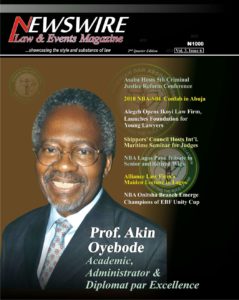
Do you need to be heard? Or your articles published? Send your views, messages, articles or press release to: newswiremagazine@yahoo.co.uk >>> We can cover your (LAW) events at the first Call: 08039218044, 08024004726
-Advertisement-
Grab our latest Magazine, "Hon. Chief C.O.C Akaolisa gets justice". Get your order fast and stress free.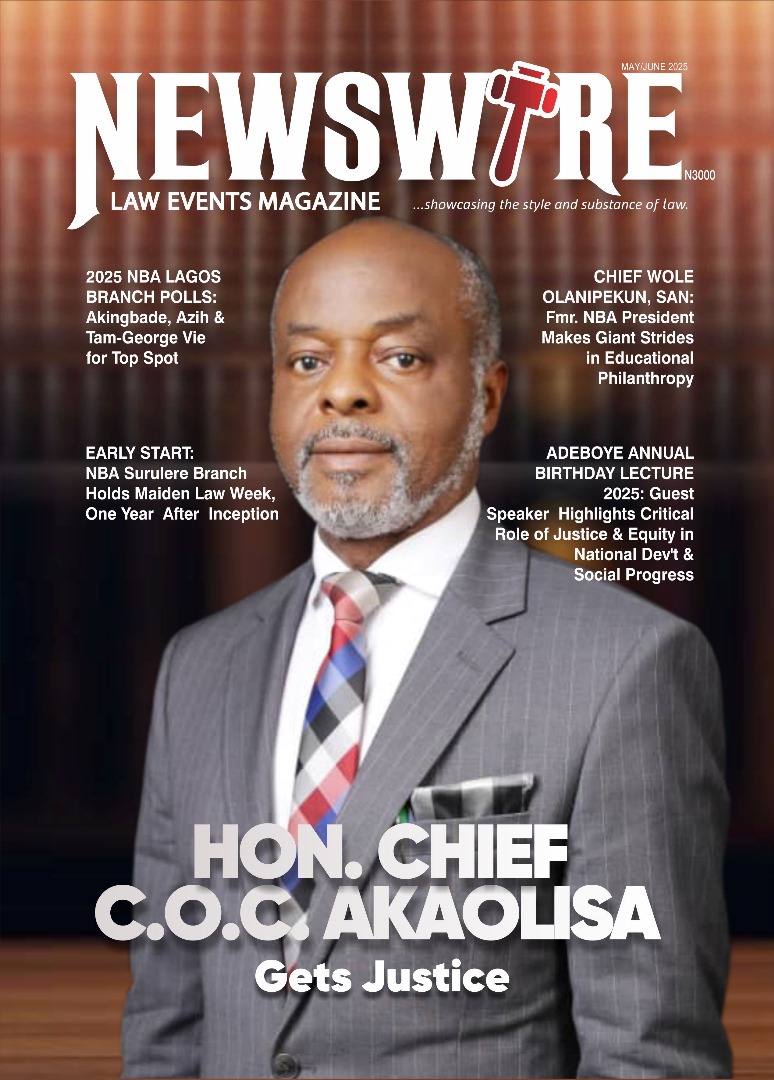
For more details about Newswire Law&Events Magazine, kindly reach out to us on 08039218044, 09070309355. Email: newswiremagazine@yahoo.co.uk. You will be glad you did


